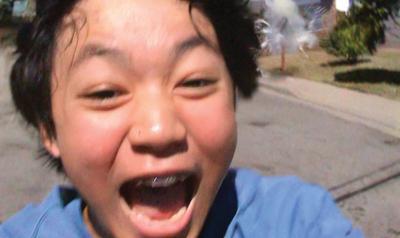The coming-of-age story is a constant in cinema — after all, in one way or another, we all had to make the journey from childhood to adulthood. It’s a common tactic for up-and-coming writers and directors to make a feature capturing their own childhood — or a story inspired by it — to break into the industry. It’s a good way to create a personal, relatable story, but also in many cases a chance to pluck the nostalgia strings of those who grew up in a similar time. That’s exactly what documentarian Sean Wang is doing with his dramatic feature debut Dídi (弟弟). This time it’s for those who experienced their teenage years in the late 2000s.
In the summer of 2008, between finishing middle school and beginning high school, Bay Area teen Chris Wang (played by Izaac Wang) — or as his friends call him, “Wang Wang” — spends his summer vacation learning lessons the hard way. He fights with friends and family, tries to make new skater friends and gets up to no good, as you’d expect of a teenage boy.
Viewers in the so-called zillennials box (on the cusp between millennials and Gen Z) might find the experience of watching Dídi similar to opening a time capsule from 2008. Sean Wang makes the extra effort to truthfully capture teenage years in the late Aughts in an honest way. The film does not present the past via a rose-tinted lens, instead showing the negative aspects of the era — including casual racism and homophobia — alongside the tender moments of growing up, making mistakes and learning from life. At its best, Dídi is a crowd-pleasing story set in 2008 that will warm the hearts of audiences. At its worst, for some, it might feel like an unwelcome hour-and-a-half of digging through old skeletons in your closet — or when your parents show your friends old baby pictures. A consequence of Sean Wang’s dedication to accurately portraying the time period is that your enjoyment of his debut hinges on your feelings about the time — and your own early-teenage years. Do you see the awkward moments of growing up as reassuring or traumatizing?
Sean Wang stated during a Q&A after his Sundance premiere that Chris is not supposed to be representative of him. Dídi is not a memoir, he said, but rather a character study — inspired by his childhood, but still a work of fiction. Using advice from The Farewell director Lulu Wang during a Sundance screenwriting workshop, the director made his project very personal, then stepped back to disassociate himself from the work and view it as fiction. This approach helped make a film that is informed by the director’s lived experience, but less burdened by the truth of his own life; thus he was able to focus on the major theme of the narrative, which the director says is shame.
Dídi speaks to the time period, from references to early social media platforms like Myspace to the street fashion and the way kids talked — both the good and the bad. It’s also the type of coming-of-age story that can appeal to a large audience thanks to its themes of adolescent shame, a solid ensemble cast and an impressive performance from young Izaac Wang.





